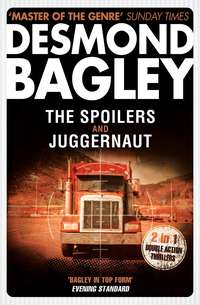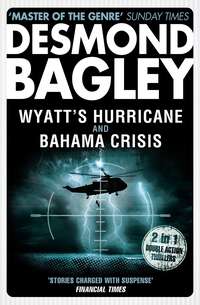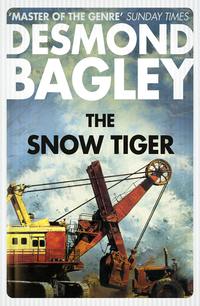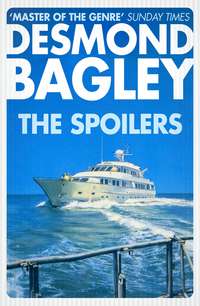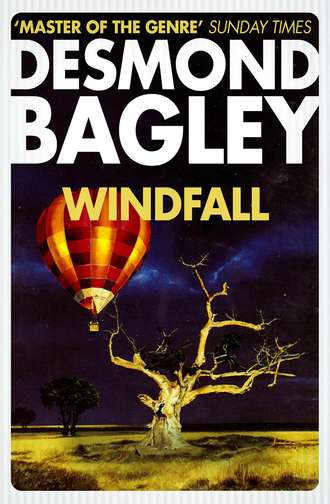
Полная версия
Windfall
His motel room was standard issue and dry. He took off his wet suit and hung it over the bath, regarded it critically, and decided it needed pressing. He wondered if Gunnarsson would stand for that on the expense account. Then he took off his shirt, hung it next to the suit, and padded into the bedroom in his underwear. He sat at the table, opened his briefcase, and took out a sheaf of papers which he spread out and regarded dispiritedly. His shoulders sagged and he looked exactly what he was—a failure. A man pushing fifty-five-with a pot belly, his once muscular body now running to fat, his brains turning to mush, and the damned dandruff was making his hair fall out. Every time he looked at his comb he was disgusted.
Ben Hardin once had such high hopes. He had majored in languages at the University of Illinois and when he had been approached by the recruiter he had been flattered. Although the approach had been subtle he was not fooled; the campus was rife with rumours about the recruiters and everyone knew what they were recruiting for. And so he had fallen for the flattery and responded to the appeals to his patriotism because this was the height of the Cold War and everyone knew the Reds were the enemy.
So they had taken him and taught him to shoot—handgun, rifle, machine-gun—taught him unarmed combat, how to hold his liquor and how to make others drunk. They told him of drops and cut-outs, of codes and cyphers, how to operate a radio and many other more esoteric things. Then he had reported to Langley as a fully fledged member of the CIA only to be told bluntly that he knew nothing and was the lowest of the low on the totem pole.
In the years that followed he gained in experience. He worked in Australia, England, Germany and East Africa. Sometimes he found himself working inside his own country which he found strange because the continental United States was supposed to be the stamping ground of the FBI and off-limits to the CIA. But he obeyed orders and did what he was told and eventually found that more than half his work was in the United States.
Then came Watergate and everything broke loose. The Company sprang more holes than a sieve and everyone rushed to plug up the leaks, but there seemed to be more informers than loyal Company men. Newspaper pages looked like extracts from the CIA files, and the shit began to fly. There were violent upheavals as the top brass defended themselves against the politicians, director followed director, each one publicly dedicated to cleaning house, and heads duly rolled, Hardin’s among them.
He had been genuinely shocked at what had happened to the Company and to himself. In his view he had been a loyal servant of his country and now his country had turned against him. He was in despair, and it was then that Gunnarsson approached him. They met by appointment in a Washington bar which claimed to sell every brand of beer made in the world. He arrived early and, while waiting for Gunnarsson, ordered a bottle of Swan for which he had developed a taste in Australia.
When Gunnarsson arrived they talked for a while of how the country was going to hell in a handcart and of the current situation at Langley. Then Gunnarsson said, ‘What are you going to do now, Ben?’
Hardin shrugged. ‘What’s to do? I’m a trained agent, that’s all. Not many skills for civilian life.’
‘Don’t you believe it,’ said Gunnarsson earnestly. ‘Look, Fletcher and I are setting up shop in New York.’
‘Doing what?’
‘Same racket, but in civilian form. The big corporations are no different than countries. Why, some of the internationals are bigger than goddamn countries, and they’ve all got secrets to protect—and secrets to find. My God, Ben; the field’s wide open but we’ve got to get in fast before some of the other guys who were canned from Langley have the same idea. We wait too long the competition could be fierce. If this Watergate bullshit goes on much longer retired spooks will be a drug on the market.’
Hardin took a swig of beer. ‘You want me in?’
‘Yeah. I’m getting together a few guys, all hand picked, and you are one of them—if you want in. With our experience we ought to clean up.’ He grinned. ‘Our experience and the pipelines we’ve still got into Langley.’
‘Sounds good,’ said Hardin.
‘Only thing is it’ll take dough,’ said Gunnarsson. ‘How much can you chip in?’
Money and Hardin bore a curious relationship. A dollar bill and Hardin were separated by some form of anti-glue—they never could get together. He had tried; God, how he had tried. But his bets never came off, his investments failed, and Hardin was the centre of a circle surrounded by dollar bills moving away by some sort of centrifugal force. He had once been married and the marriage had failed as much by his inability to keep money as by the strain imposed by his work. The alimony payments now due each quarter merely added to the centrifugal force.
Now he shook his head. ‘Not a thin dime,’ he said. ‘I’m broke and getting broker. Annette’s cheque is due Tuesday and I don’t know how I’m going to meet that.’
Gunnarsson looked disappointed. ‘As bad as that?’
‘Worse,’ said Hardin glumly. ‘I’ve got to get a job fast and I have to sweet talk Annette. Those two things are holding my whole attention.’
‘Gee, Ben; I was hoping you’d be with us. There’s nobody I’d rather have along, and Fletcher agrees with me. Only the other day he was talking about how ingeniously you shafted that guy in Dar-es-Salaam.’ He drummed his fingers on the table. ‘Okay, you don’t have money, but maybe something can be worked out. It won’t be as sweet a deal as if you came in as a partner but it’ll be better than anything else you can get. And we still want you along because we think you’re a good guy and you know the business.’
So a deal had been worked out and Hardin went to work for Gunnarsson and Fletcher Inc not as a partner but as an employee with a reasonable salary. At first he was happy, but over the years things began to go wrong. Gunnarsson became increasingly hard-nosed and the so-called partnership fell apart. Fletcher was squeezed out and Gunnarsson and Fletcher Inc became Gunnarsson Associates. Gunnarsson was the ramrod and let no one forget it.
And Hardin himself lost his drive and initiative. No longer buoyed by patriotism he became increasingly dissatisfied with the work he was doing which in his view fulfilled no more elevating a function than to increase the dividends of shareholders and buttress the positions of corporate fatcats. And he was uneasy because a lot of it was down-right illegal.
He fell down on a couple of jobs and Gunnarsson turned frosty and from then on he noted that he had been down-graded as a field agent and was relegated to the minor investigations about which no one gave a damn. Like the Hendrix case.
Hardin lay on the bed in the motel and blew a smoke ring at the ceiling. Come on, Hardin, he thought. You’ve nearly got a Hendrix—you’re nearly there, man. Think of the bonus Gunnarsson will pay you. Think of Annette’s alimony.
He smiled wryly as he remembered that Parker had referred to him as a ‘private dick’. Parker had been reading too many mysteries. Natural enough, though; wasn’t this Chandler country; Philip Marlowe country; ‘down these mean streets a man must go’ country? Come on, you imitation Marlowe, he said to himself. Get off your ass and do something.
He swung his legs sideways, sat on the edge of the bed, and reached for the telephone. From what he had gathered the owner of the Parker house operated from her home in Pasadena, and it was still not too late in the evening to talk to her. He checked the number in his notebook and dialled. After a few buzzes a voice said in his ear, ‘The White residence.’
The White House! He suppressed an inane chuckle, and said, ‘Mrs White?’
‘It is she speaking.’
‘My name is Hardin, and I represent Gunnarsson Associates of New York. I understand you own a house in North Hollywood.’
‘I own several houses in North Hollywood,’ she said. ‘To which do you refer?’
‘It would be 82, Thorndale; at present rented by Mr Parker.’
‘Yes, I own that property, but it is rented to Mrs Parker.’
‘I see; but I have no interest in the Parkers, Mrs White. I am interested in a previous tenant, a man called Hendrix, Henry Hendrix.’
‘Oh, him!’ There was a sudden sharpness to Mrs White’s voice. ‘What is your business, Mr Hardin?’
‘I’m a private investigator.’
‘A private eye,’ said Mrs White, confirming his theory that he was in mystery readers’ country. ‘Very interesting, I must say. What do you want him for? Nothing trivial, I hope.’
He explored the nuances of her voice, and said, ‘I can’t tell you, Mrs White. I just find them; what happens to them is out of my hands.’
‘Well, I hope that young man gets his comeuppance,’ she said bitterly. ‘He wrecked that house. It took me thirty-five hundred dollars to repair the damage done by him and his friends.’
‘I’m sorry to hear that,’ said Hardin, injecting sincerity into his voice. ‘How did it happen?’
‘He—Hendrix, I mean—rented the house and agreed to abide by all the conditions. What I didn’t know was that he was leader of what they call a commune. You know; those young people who go around with dirty feet and the men wearing head bands.’ Hardin smiled. ‘Mrs Parker tells me the place still stinks of marijuana. And the filth they left there you wouldn’t believe.’
‘And when did they leave?’
‘They didn’t leave, they were thrown out,’ said Mrs White triumphantly, ‘I had to call the Sheriff’s Department.’
‘But when was this?’
‘Must be nine…no, ten months ago.’
‘Any idea where they went?’
‘I don’t know, and I don’t care. For all I care they could go drown, only it would dirty up the ocean.’
‘You say Hendrix was the leader of the commune?’
‘He paid the rent.’ Mrs White paused. ‘But no; I don’t reckon he was the leader. I think they used him as a front man because he was cleanest. The leader was a man they called Biggie. Big man—tall as a skyscraper and wide as a barn door.’
Hardin made a note. ‘Do you know his name—his last name?’
‘No; they just called him Biggie. He had long blond hair,’ she said. ‘Hadn’t been washed for months. Kept it out of his eyes with one of those head bands. Shaggy beard. He walked around with his shirt open to the waist. Disgusting! Oh, and he wore something funny round his neck.’
‘What sort of funny?’
‘A cross. Not a decent Christian cross but a funny cross with a loop at the top. It looked like gold and he wore it on a chain. You couldn’t help but notice it the way he wore his shirt open.’
‘Were there any women in the commune, Mrs White?’
‘There were. A lot of brazen hussies. But I didn’t have any truck with them. But I’ll tell you something, Mr Hardin. There were so many of those folks in that little house they must have slept head-to-foot. I don’t think there could have been a virgin among them, and I don’t think they were married, either.’
‘You’re probably right,’ said Hardin.
‘Orgies!’ said Mrs White, relishing the word. ‘We found a lot of incense sticks in the house and some funny statues, and they weren’t made in the way God made man. I knew then I was right to get rid of that man. Could have been another Charles Manson. You heard of him back East?’
‘Yes, I’ve heard of Charles Manson.’ Hardin closed his notebook. ‘Thank you for your information, Mrs White; you’ve been very co-operative.’
‘Are you going to put those folks in jail where they belong?’
‘I’m a private investigator, Mrs White; but if I find evidence of wrongdoing I’ll pass the information on to the authorities. Thanks for your help.’
He put down the telephone, lit another cigarette, and lay back on the bed. Incense sticks and strange statues! And the funny cross with the loop at the top was probably an Egyptian ankh. He shook his head. God, the things the kids were up to these days.
He wondered briefly who else was looking for Hendrix and then closed his eyes.
THREE
Hardin walked out of his room next morning into a day that was rainwashed and crisp. He put his bags into his car and drove to the front of the motel. As he got out he looked in astonishment towards the north. There, stretched across the horizon, was a range of mountains with snow-capped peaks rising to a height of maybe 10,000 feet. They had not been there the previous day and they looked like a theatrical backdrop.
‘Hollywood!’ he muttered, as he went into the inside for breakfast.
Later, as he was tucking his credit card back into his wallet, he said, ‘What are those mountains over there?’
The woman behind the desk did not raise her head. ‘What mountains?’ she asked in an uninterested way.
‘That range of mountains with snow on the top.’
She looked up. ‘Are you kidding, mister? There are no mountains out there.’
He said irritably, ‘Goddamn it! They’re practically on your doorstep. I’m not kidding.’
‘This I’ve got to see.’ She came from behind the desk and accompanied him to the door where she stopped and gasped. ‘Jesus, those are the San Gabriels! I haven’t seen them in ten years.’
‘Now who’s kidding who?’ asked Hardin. ‘How could you miss a thing like that?’
Her eyes were shining. ‘Musta been the rain,’ she said. ‘Washed all the smog outa the air. Mister, take a good look; you ain’t likely to see a sight like that for a long time.’
‘Nuts!’ said Hardin shaking his head, and walked towards his car.
As he drove downtown he pondered on the peculiarities of Los Angeles. Any community that could lose a range of mountains 10,000 feet high and 40 miles long was definitely out of whack. Hardin disliked Los Angeles and would not visit it for pleasure. He did not like the urban sprawl, so featureless and monotonous that any section of the city was like any other section. He did not like the nutty architecture; for his money it was a waste of time to drive down to Anaheim to visit Disneyland—you could see Disneyland anywhere in LA. And he did not like the Los Angeles version of the much lauded Californian climate. The smog veiled the sun and set up irritation is his mucous membranes. If it did not rain, bush fires raged over the hills burning out whole tracts of houses. When it rained you got a year’s supply inside twelve hours and mud slides pushed houses into the sea at Malibu. And any day now the San Andreas Fault was expected to crack and rip the whole tacky place apart. Who would voluntarily live in such a hell of a city?
Answer: five million nuts. Which brought his mind back smartly to Hendrix, Biggie and the commune. To hell with Gunnarsson; he would go see Charlie Wainwright.
The Los Angeles office of Gunnarsson Associates was on Hollywood Boulevard at the corner of Highland, near Grauman’s Chinese Theatre. His card got him in to see Charlie Wainwright, boss of the West Coast region, who said, ‘Hi, Ben; what are you doing over here?’
‘Slumming,’ said Hardin as he sat down. ‘You don’t think I’d come here if I had a choice?’
‘Still the same old grouch.’ Wainwright waved his hand to the window. ‘What’s wrong with this? It’s a beautiful day.’
‘Yeah; and the last for ten years,’ said Hardin. ‘I had that on authority. I’ll give you a tip, Charlie. You can get a hell of a view of the San Gabriels today from the top of Mullholland Drive. But don’t wait too long; they’ll be gone by tomorrow.’
‘Maybe I’ll take a drive up there.’ Wainwright leaned back in his chair. ‘What can we do for you, Ben?’
‘Have you got a pipeline into the Sheriff’s office?’
‘That depends on what you want to come down it,’ said Wainwright cautiously.
Hardin decided not to mention Hendrix. ‘I’m looking for a guy called Biggie. Seems he’s mixed up in a commune. They were busted by sheriff’s deputies about ten months ago over in North Hollywood.’
‘Not the LAPD?’ queried Wainwright. ‘Don’t they have jurisdiction in North Hollywood?’
Hardin was sure Mrs White had not mentioned the Los Angeles Police Department, but he checked his notebook. ‘No; my informant referred to the Sheriff’s Department.’
‘So what do you want?’
Hardin looked at Wainwright in silence for a moment before saying patiently, ‘I want Biggie.’
‘That shouldn’t be too difficult to arrange.’ Wainwright thought a while. ‘Might take a little time.’
‘Not too long, I hope.’ Hardin stood up. ‘And do me a favour, Charlie; you haven’t seen me. I haven’t been here. Especially if Gunnarsson wants to know. He’s playing this one close to his chest.’
‘How are you getting on with the old bastard?’
‘Not bad,’ said Hardin noncommittally.
Two hours later he was in a coffee shop across from City Hall waiting for a deputy from the Sheriff’s Department. Wainwright had said, ‘Better not see him in his office—might compromise him. You don’t have an investigator’s licence for this state. What’s Gunnarsson up to, Ben? He’s not done this before. These things are usually handled by the local office.’
‘Maybe he doesn’t like me,’ said Hardin feelingly, thinking of the miles of interstate highways he had driven.
He was about to order another coffee when a shadow fell across the table. ‘You the guy looking for Olaf Hamsun?’
Hardin looked up and saw a tall, lean man in uniform. ‘Who?’
‘Also known as Biggie,’ said the deputy. ‘Big blond Scandahoovian—monster size.’
‘That’s the guy.’ He held out his hand. ‘I’m Ben Hardin. Coffee?’ At the deputy’s nod he held up two fingers to a passing waitress.
The deputy sat opposite. ‘Jack Sawyer. What do you want with Biggie?’
‘Nothing at all. But he’s running with Henry Hendrix, and I want to visit with Hank.’
‘Hendrix,’ said Sawyer ruminatively. ‘Youngish—say, twenty-six or twenty-seven; height about five ten; small scar above left eyebrow.’
‘That’s probably my boy.’
‘What do you want with him?’
‘Just to establish that he’s his father’s son, and then report back to New York.’
‘Who wants to know?’
‘Some British lawyer according to my boss. That’s all I know; Gunnarsson doesn’t confide in me. Operates on need to know.’
‘Just like all the other ex-CIA cloak and dagger boys,’ said Sawyer scornfully. He looked at Hardin carefully. ‘You were a Company man, too, weren’t you?’
‘Don’t hold it against me,’ said Hardin, forcing a grin.
‘Even if I don’t that doesn’t mean I have to like it. And you don’t have an investigator’s licence good in California. If I didn’t owe Charlie Wainwright a couple I wouldn’t be here now. I don’t like you guys and I never have.’
‘Now wait a minute,’ said Hardin. ‘What’s eating you?’
‘I’ll tell you.’ Sawyer leaned forward. ‘Last year we busted a gang smuggling cocaine from Mexico. Turned out that half of them were bastards from the CIA. They claimed we’d wrecked one of their best Mexican operations. We said they were breaking the law of the United States and we were going to jail them. But do you think we could? Those sons of bitches are walking around free as air right now.’
Hardin said, ‘You can’t blame that on me.’
‘I guess not,’ said Sawyer tiredly. ‘Okay, I’ll tell you where to find Biggie.’ He stuck out his forefinger. ‘But step out of line one inch and I’ll nail your hide to the barn door, even if it’s for spitting on the sidewalk.’
‘Thanks,’ said Hardin ironically.
‘You’ll find the gang down at Playa del Rey. If they’re not there try Santa Monica, down near the Bristol Pier. There’s a greasy spoon called Bernie’s where they hang out.’
Hardin wrote in his notebook. ‘Does Hendrix have a record? Or Hamsun?’
‘Hamsun’s been busted for peddling pot. He had a fraction under an ounce on him, so it didn’t come to much. Nothing on Hendrix; at least, not here.’
‘I’ve been wondering about something,’ said Hardin, putting away his notebook. ‘When you cracked down on the commune in North Hollywood you found some funny things in the house, I hear. Statues of some kind, and not the kind a good, Christian woman would like.’
‘The good, Christian woman being Mrs White,’ said Sawyer ironically. ‘The old witch. There’s nothing to it, Hardin. It’s just that the kids tried their hand at pottery; reckoned they could sell the stuff at the Farmer’s Market and make a few dollars. That pottery kiln did most of the damage to the house when it blew up.’
‘Is that all?’
‘That’s all,’ said Sawyer, and laughed. ‘Turned out they weren’t very good at sculpting. They didn’t know enough anatomy; least, not the kind you need for sculpting.’ He became philosophical. ‘They’re not a bad crowd of kids, not as things are these days. Sure, they smoke pot, but who doesn’t? I bet my own kids do when I’m not around. They’re just mostly beach bums, and that’s not illegal yet.’
‘Sure,’ said Hardin. He had a sudden thought. ‘Does Biggie still wear the ankh?’
‘The what?’
‘The ankh.’ He sketched it on the back of the menu.
‘Yeah, he still wears that thing. Didn’t know it had a name. It should be valuable. It’s big and looks as though it’s solid gold. But it would take some real crazy guy to rip it off Biggie.’
Hardin spent two days at Playa del Rey and drew a blank, so he went up the coast to Santa Monica. He found Bernie’s and had a cup of coffee, steering clear of the hamburgers. The place stank of rancid oil and he judged the level of hygiene was good for a jail sentence. The coffee was lousy, too, and there was lipstick on his cup.
He questioned the harassed waitress intermittently as she passed and repassed his table and again drew a blank. Yes, she knew Biggie but had not seen him for some time. No, she didn’t know anyone called Hendrix. Hardin pushed aside the unfinished coffee and left.
For another two days he roamed the Santa Monica water front, questioning the kids—the beach bums and surfing freaks—and made little progress. Biggie was well known but no one had seen him around. Hendrix was less known and no one had seen him, either. Hardin looked gloomily at the offshore oil rigs which periodically sprang leaks to poison the fish and kill the seabirds, and he cursed Gunnarsson.
On the evening of the second day he checked again at Bernie’s. As he stared distastefully at the grease floating on the surface of his coffee a girl sidled up next to him. ‘You the guy looking for Biggie?’
He turned his head. Her long uncombed hair was a dirty blonde and her make-up had been applied sloppily so that she looked like a kid who had just used the contents of her mother’s dressing table for the first time. ‘I’m the guy,’ he said briefly.
‘He don’t like it.’
‘I’m broken hearted.’
She made a face. ‘But he’ll talk to you.’
‘When and where?’
‘Tonight—eight o’clock. There’s an old warehouse on Twenty-seventh Street at Carlyle. He’ll be there.’
‘Look,’ said Hardin, ‘I’m not interested in Biggie, but he has a sidekick called Hendrix—Hank Hendrix. Know him?’
‘Sure.’
‘He’s the guy I want to talk with. Let him be at the warehouse. I don’t give a damn about Biggie.’
The girl shrugged. ‘I’ll pass the word.’
Hardin was at the rendezvous an hour early. The abandoned warehouse was in a depressed area long overdue for urban renewal; the few windows still intact were grimy, and the place looked as though it would collapse if an over-zealous puff of air blew in from the Pacific. He tested a door, found it unlocked, and went inside.
It took only a few minutes to find that the building was empty. He explored thoroughly, his footsteps echoing in the cavernous interior, and found a locked door at the back. He unlocked it and returned to his car where he sat with a good view of the front entrance and lit a cigarette.
Biggie and Hendrix showed up halfway through the third cigarette. Biggie was unmistakable; tall and broad he looked like a circus strong man, and there was a glint of gold on his bare chest. Hendrix, who walked next to him, was no light-weight but next to Biggie he looked like a midget. They went into the warehouse and Hardin finished his cigarette before getting out of the car and crossing the road.



